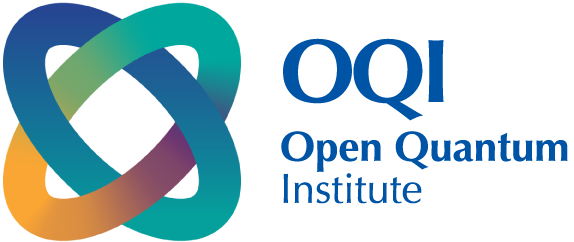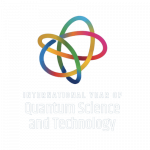From ideation to proof of concept: OQI use cases making progress towards impact
16th September 2025
As one of OQI’s main pillars of work, we are supporting the development of quantum computing use cases that address real-world problems with a societal impact and could accelerate the achievement of the UN Sustainable Development Goals (SDGs). Since the initiation of OQI, a total of 19 use cases have been supported at different stages in their development. These use cases are led by interdisciplinary collaboration between researchers, developers, entrepreneurs, UN organisations and NGOs, with quantum computing, classical computing, domain-specific, impact and SDG expertise
OQI support spans over the several phases of development of the use cases, providing technical and project management support and connecting with relevant experts around the world to foster interdisciplinary collaboration and access expertise and tools needed to build impactful use cases.
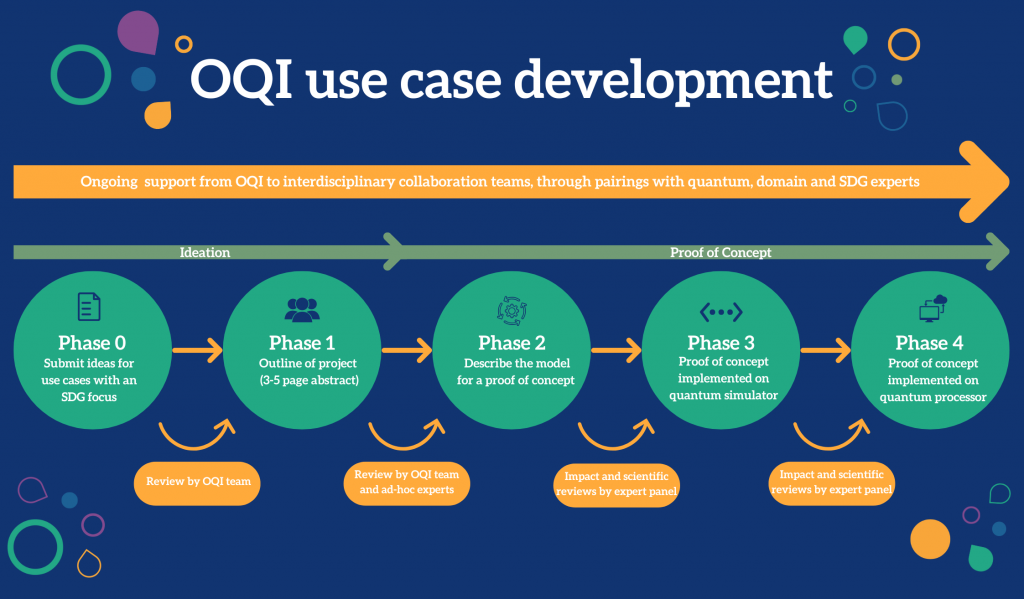
At OQI, we base our work on scientific rigour – a core value we share with CERN, our host institution. Each phase goes through a review process to select the most promising use cases to advance from ideation to proof of concept (PoC).
What is a proof of concept?
In the context of OQI, a proof of concept (PoC), is a demonstration that quantum computing can solve a problem, either on current or future quantum hardware devices. These problems must be linked to the UN Sustainable Development Goals (SDGs) and the quantum solution should aim to show an advantage over classical computing methods (at least once implemented on fault-tolerant quantum computers, which are powerful and reliable enough to run large-scale calculators and error correction).
When developing a PoC, use case teams rigorously assess the complexity and computational challenges and carefully analyse the potential of a quantum computing solution. This analysis includes:
- The justification for the choice of quantum approach (quantum or quantum-inspired).
- Estimation of the resources and timeline needed for implementation on quantum devices.
- A benchmarking strategy for comparing results against state-of-the-art classical approaches
At the PoC level, external panels of experts are involved to guide the selection based on the scientific and impact validity and the feasibility of a small-scale PoC on today’s quantum devices available on the cloud – first on quantum simulator, then on quantum computer. In May 2025, eight full proposals for use cases at the end of phase 2 went through this external evaluation with two panels of experts. This included an impact panel evaluating real-world impact and a scientific panel evaluating scientific and quantum computing relevance – formed of 42 experts spanning diverse academic and industrial backgrounds from top international organisations and institutions in their field. This process ensures that OQI makes fair and transparent evaluations on the progress and outcomes of the use cases.
The eight full proposals for use cases were assessed on the following criteria:
- Scientific and computational relevance: determining whether the proposal is scientifically sound and if the problem was accurately described in mathematical terms, with a clearly framed computational approach to it.
- Quantum computing relevance: assessing the existing classical computing approach and bottlenecks and clear justification of the relevance for using quantum computing to tackle the problem. Use cases were evaluated on their feasibility to implement a small-scale PoC on quantum devices and on the estimated resources they would need to lead to a full-scale solution with potential quantum advantage.
- Impact relevance: evaluating the local and global impact on people and the planet, aligned with the UN SDGs.
- Team composition: assessing if a use case team brings together the necessary expertise, incorporates diversity and inclusion and is equipped to collaborate openly in the next phase of the PoC.
Outcome of the evaluation panels
The panels of experts provided constructive feedback which helped use case teams to continue strengthening their work and contributed to refining OQI’s methodology during the pilot phase. From the evaluation, one use case was selected to move to the next phase (phase 3), which will lead to implementation on a quantum computing simulator. Four other teams were offered an extension period to continue refining their full proposals during the summer and three other use cases were concluded, with teams remaining active members in the OQI community.
Exploring quantum computing use cases is no easy task. Identifying the problems that could potentially lead to a quantum advantage remains a key focus of the international quantum community. Adding the extra layer of ensuring these problems also create a positive societal impact makes the challenge more complex, but also more rewarding. At OQI, together with our global community of experts, we are committed to addressing this challenge through a collaborative and inclusive approach.
The use case Accelerating Novel Antimicrobial Discovery, led by qBraid, Global Antibiotic Research and Development Partnership (GARDP), McMaster University and the University of Cagliari, is now in phase 3. Antimicrobial Resistance (AMR) is one of the main global health threats, putting significant pressure on healthcare systems around the world. One of the key drivers of AMR is the length of time needed for discovering new antibiotics, despite there being a number of chemical compounds still to explore. The team is using quantum reservoir computing – a method which uses quantum systems to help process and predict complex patterns in data – to predict how molecular properties evolve over time, with the potential to identify compounds that could be used to develop new antibiotics.
We are grateful to all the experts for their valuable contributions to the evaluation panels and to the OQI pilot phase!
Scientific Panel
- Elica Kyoseva (NVIDIA)
- Barry Sanders (University of Calgary)
- Brad Lackey (Microsoft)
- Ivano Tavernelli (IBM)
- Clément Javerzac (University of Applied Sciences Northwestern Switzerland (FHNW))
- Ryan Babbush (Google)
- Olivier Ezratty (Quantum Energy Initiative, Author)
- Markus Reiher (ETH Zurich)
- Albert Werner (University of Copenhagen)
- Daniel Stilck Franca (University of Copenhagen)
- Koen Leijnse (Quantum Delta Netherlands (QDNL))
- Will Zeng (Unitary Foundation)
Impact Panel
- Deborah Nas (Quantum Delta Netherlands (QDNL)
- Mira Wolf-Bauwens (IBM, now GESDA)
- Kyriacos Koupparis (World Food Program (WFP))
- Stela Mocan (World Bank Group)
- Gillian Makamara (International Telecommunication Union (ITU))
- Davide Fanciulli (Beyond Lab)
- Julia Cramer (Quantum Delta Netherlands (QDNL))
- Damien Somé (Global Antibiotic Research and Development Partnership (GARDP))
- Natasha Oughton (UK’s National Quantum Computing Center (NQCC))
- Yvan Serret (PwC)
Explore our full pipeline of use cases.
